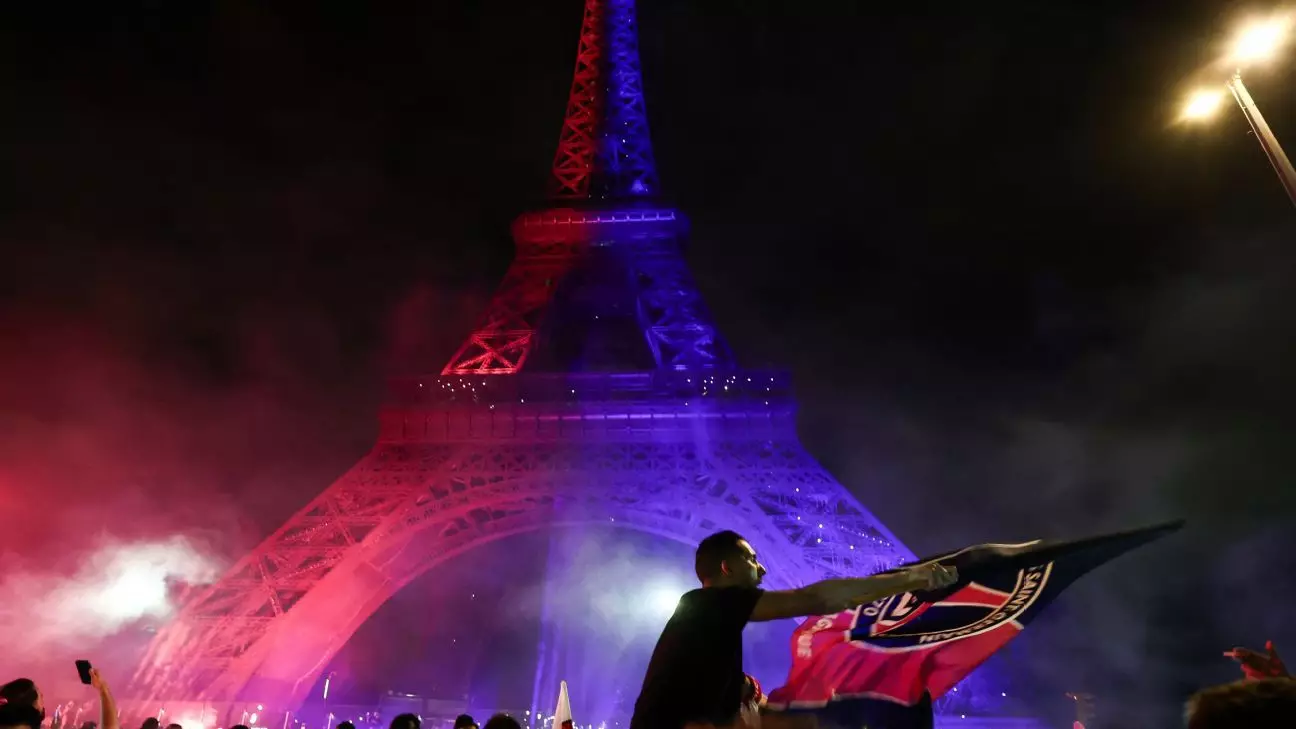The jubilation surrounding Paris Saint-Germain’s historic Champions League triumph quickly morphed into chaos, casting a shadow over what should have been an unadulterated night of celebration. An astonishing 5-0 victory against Inter Milan had initially sparked joyous revelry, with fans pouring into the streets, but this exuberance gave way to violence that led to two tragic fatalities and left a police officer in a coma. In a country that prides itself on sporting culture and the passion that accompanies it, these incidents reveal a disturbing undercurrent to national celebrations that can no longer be ignored.
Collective Euphoria and Individual Tragedy
The scenes of ecstatic fans beneath the illuminated Eiffel Tower, draped in PSG colors, stand in stark contrast to the grievous events that unfolded concurrently. A night filled with hope turned fatal for a 17-year-old boy in Dax, who lost his life during a street party, alongside the tragic death of a young man in Paris due to reckless behavior during the festivities. These incidents raise crucial questions about accountability during moments of collective euphoria—how can an event so joyous lead to such disappointing and senseless loss of life?
While authorities continue investigations into these fatalities, one cannot ignore the socio-political implications surrounding them. Is there a systemic failure within France’s approach to managing public celebrations? The reckless violence that plagued such moments of national pride cannot exclusively be attributed to the fervor of fans celebrating success. It is symptomatic of deeper societal issues, such as a lack of effective crowd management and insufficient preventative measures to maintain public order during large gatherings.
The Cost of Celebration
Adding another layer of tragedy is the injury sustained by a police officer due to fireworks—a somber reminder that the very fabric of security can become undermined in the heat of celebration. Paris police chief Laurent Nunez reported a shocking number of injuries, some severe, and nearly 300 arrests on a night that had begun in celebration yet soon descended into chaos. Fire services were overwhelmed as they battled unnecessarily sparked blazes, attesting to a lawlessness that overshadowed the celebration.
While moments of exuberance like these should attract admiration and commercial success, they instead turn into operations for law enforcement. The immense police presence and tactical approaches reminiscent of military operations are increasingly becoming the norm at public gatherings. Using tear gas and water cannons to control crowds is a stark reminder of the potential for joy to devolve into brutality. It raises profound questions about state intervention and the kind of society we wish to foster—are we cultivating an atmosphere of fear that stifles genuine celebration?
Lessons from the Past
This isn’t an isolated incident; echoes of past chaos, particularly following the French World Cup victory in 2018, resonate within the current narrative. Nunez’s claims regarding the disruptive elements present during celebrations highlight an issue entrenched in cultural behavior during major sporting events. Are we observing merely a minority of hoodlums who spoil the party, or is there something more systemic occurring? It’s essential for the discourse around football celebrations to shift, focusing on both the joy of community and the personal responsibility expected from individuals.
One can’t help but question the societal impact of football culture itself. It embodies immense pride and passion, yet it periodically succumbs to a tribal mentality that can quickly turn destructive. The collective rush of supporters, while often celebratory, requires an equal measure of individual accountability among attendees to ensure safety and enjoyment for all.
Beyond Football: A Cultural Examination
The recent events surrounding PSG’s triumph highlight a crucial need for broader cultural reflection. The dialogue should extend beyond mere celebrations of sports achievements and venture into examining how we engage with our national identity and community behavior. The duality of sports representing both community and chaos necessitates an evaluation of how our societal norms shape public celebrations. In this era, there is a pressing responsibility for fans and institutions to revisit the principles of shared joy grounded in respect and responsibility, ensuring that celebration never leads to tragedy.

